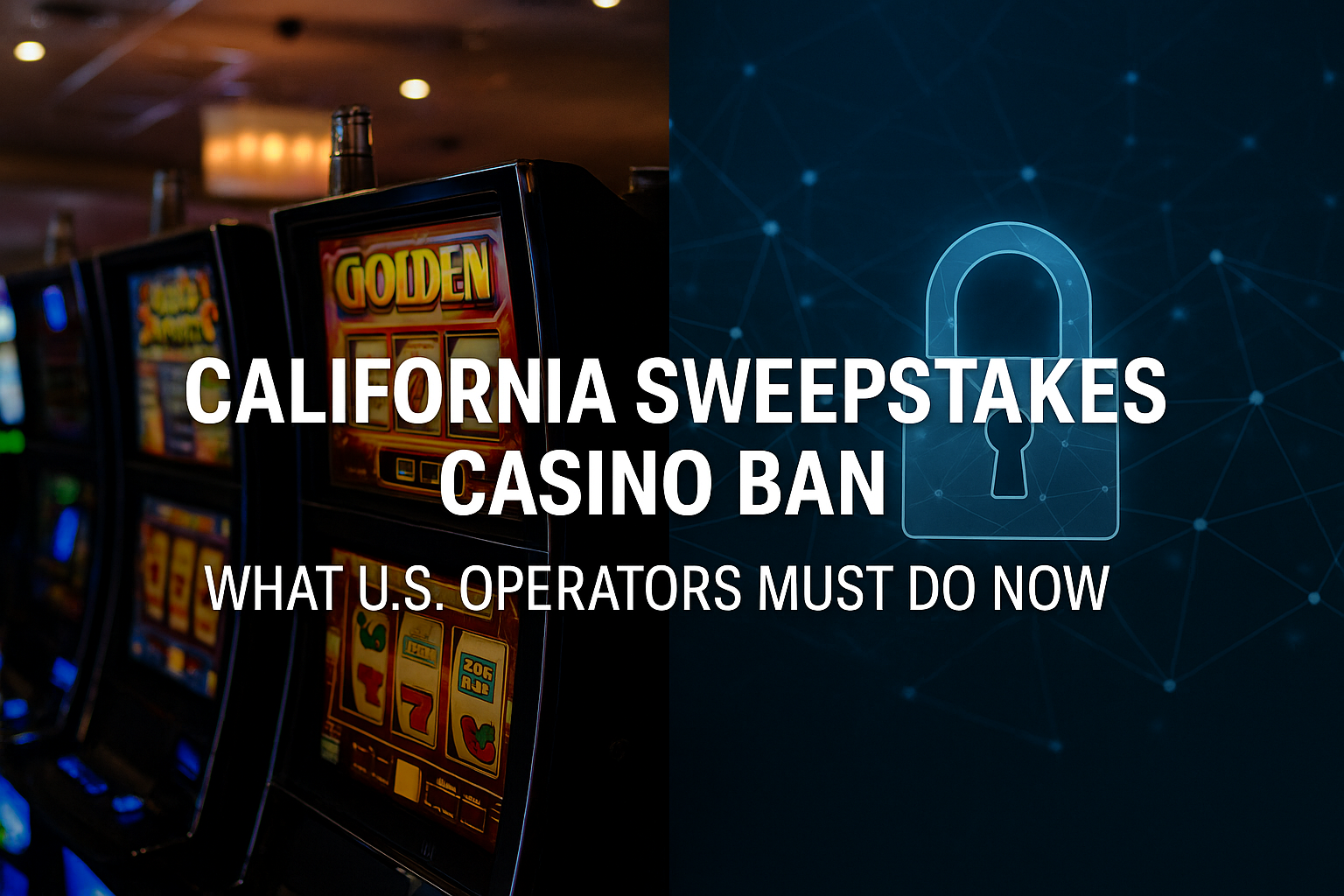California’s Sweepstakes Ban: A September Wake-Up Call
In September 2025, California officially outlawed sweepstakes-style casinos, closing a regulatory loophole that had allowed unlicensed “simulated gambling” operations to flourish in the state. Wikipedia The ban is scheduled to take effect in January 2026, giving stakeholders just months to adjust or exit.
This pivotal move sends a message: sweepstakes models—long tolerated in regulatory gray zones—are becoming untenable in major U.S. markets. As operators, affiliates, and platform providers watch this unfold, several questions must guide your next steps:
- Which markets will follow California’s lead?
- How do you transition or sunset sweepstakes operations?
- What compliance, technical, and security work must you accelerate?
Why California’s Decision Matters
Closing a Gray Zone
Sweepstakes casinos had operated in the blurred boundary between skill games, promotional contests, and gambling. For years, operators leveraged advertising, alternative currencies, and clever terms to argue they were not “real gambling.” But the California law removes that ambiguity from a major U.S. state.
This ban makes California the fifth state to explicitly outlaw sweepstakes casinos. Wikipedia States like New Jersey, Louisiana, and others have already taken steps to clamp down on similar models.
Market & Competitive Implications
California is a huge market in terms of population and consumer spending. Even if sweepstakes hasn’t penetrated as deeply there as in others, the ban sends a strong signal—a regulatory “red line” that can shift attitudes in statehouses across the country.
Operators that rely heavily on sweepstakes revenue, affiliate traffic, or prediction-market style offerings must now re-evaluate their entire business model.
Transition Window & Strategic Risk
With enforcement slated for January 2026, there is a limited window to:
- Adjust or wind down sweepstakes offerings in California
- Migrate users or traffic to licensed gambling or skill-based formats
- Update marketing, affiliate programs, and branding to avoid non-compliance
- Review contracts, tech stacks, and compliance obligations
Delaying this transition risks being shut out, fined, or disallowed from re-entering the market later.
Action Plan: How to Pivot from Sweepstakes Models
Here’s a strategic roadmap operators should adopt now:
1. Audit Your Exposure in California
- Identify all sweepstakes-based sites, domains, promotions, and affiliates targeting California.
- Estimate current traffic and revenue derived from California users (or geographic proxies).
- Map technical dependencies (payment flows, currency systems, game logic) tied to sweepstakes models.
2. Legal & Compliance Migration
- Engage regulatory counsel to interpret the new law and align surrender or conversion terms.
- Begin sunset plans for sweepstakes products in California, with clear end-of-life dates.
- Assess whether parts of your platform can transition to licensed iGaming, skill games, or social gaming formats.
3. Technical & Security Alignment
- Reconfigure systems to disable sweepstakes features for California users.
- Ensure geolocation, IP filtering, and identity verification block access or enforce compliance.
- Remove or disable affiliate tracking, tokens, or credits that resemble gambling for CA users.
4. Marketing & Affiliate Messaging Reset
- Purge all marketing language, ads, or campaigns referencing “play for cash”, “redeem prizes”, or sweepstakes-styled mechanics for California.
- Educate affiliate networks and partners of impending changes and compliance deadlines.
- Transition marketing to legal offerings (e.g. skill games, promotions) where possible.
5. Monitor Other States & Proactive Defense
- States often follow precedent. California may serve as a template. Be ready in states where sweepstakes exist.
- Keep eyes on states with ongoing enforcement (e.g., New York, Michigan, etc.).
- Use this transition to tighten security and compliance foundations: KYC enforcement, audit trails, data logging, and Zero Trust configurations.
Risks, Challenges & Considerations
- Revenue fallback: Some users may drop away rather than convert to legal gaming models.
- Regulator scrutiny: Aggressive enforcement states may retroactively demand penalties or removal of assets.
- Affiliate attrition: Some affiliate partners are deeply entrenched in sweepstakes — they may resist conversion.
- Technical debt: Legacy sweepstakes architectures may not be modular, making clean separation difficult.
- Brand trust: Users may perceive sweepstakes shutdowns as forced — messaging must be clear and consumer-centric.
Conclusion
As of September 9, 2025, California’s sweepstakes casino ban makes it unmistakably clear: legislative tolerance for borderline gaming models is shifting. Operators should not wait for enforcement—they should act now.
By auditing exposure, migrating offerings, reworking tech and marketing, and preparing regulatory defenses, you can transition strategically rather than scramble under enforcement pressure.
Contact Saturn Partners to help you model your transition plan, refactor your systems, vet compliance strategy, and ensure your U.S. operations survive—and even thrive—through this regulatory pivot.

